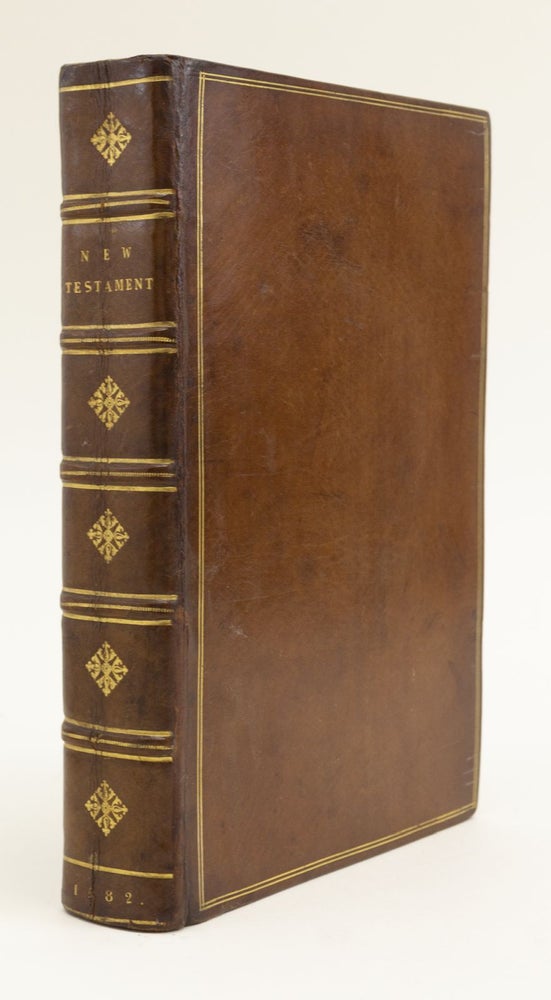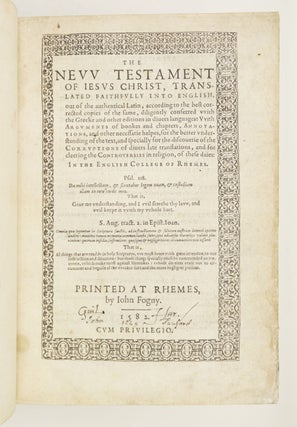THE NEW TESTAMENT OF IESUS CHRIST, TRANSLATED FAITHFULLY INTO ENGLISH, OUT OF THE AUTHENTICAL LATIN . . . IN THE ENGLISH COLLEGE OF RHEMES.
(Rheims: Jean de Foigny, 1582). 235 x 160 mm. (9 1/4 x 6 1/4"). 14 p.l., 745, [27] (tables, glossary, and errata) pp.Translated by Gregory Martin, with William Allen, Richard Bristow and William Reynolds as revisers. FIRST EDITION IN ENGLISH of the Roman Catholic version of the New Testament.
Early 19th century English diced russia, gilt fillet border on covers, spine panels with gilt fleuron centerpiece, gilt titling, turn-ins with gilt chain roll, marbled edges and endpapers (very expert repair to a short portion at head of front joint). Title page with early inscription at foot: "Guil. Har." (very likely indicating the name "William Harvey"); marginal notes in the same hand on pp. 320 and 392, pointing out some inconsistencies in the footnotes; title also with 1849 owner signature of John Fairford; last page inscribed (in a different early hand) "Ei debes quod habes cui debes quod es," a slight adaptation of St. Ambrose's commentary on Luke 18:20 ("Honor thy father and mother"), meaning "To the one you owe all you have, to the other you owe all you are"; below that another inscription, noting that "W P" finished reading the text on 29 June 1745; the latter hand may be responsible for manuscript notes on pp. 375 and 465. Herbert 177; Pforzheimer 68; STC 2884; ESTC S102491. ◆Joints lightly worn, spine with slight vertical crease, a few tiny nicks and very light scratches to boards, but the pleasing binding solid and the leather lustrous. Title page very lightly discolored, small tears in the margins of two leaves (M3-4; neatly repaired without affecting the text), but these defects quite minor, and, in all, AN UNUSUALLY FINE, CLEAN COPY.
Unlike the vast majority of famous 16th and 17th century British Bibles, which are typically subjected to frequent use, this is an especially well-preserved and appealing copy of the first printing of the first Roman Catholic Bible in English. Translated between September 1578 and July 1580 by Gregory Martin (1542?-82), the Rheims New Testament borrowed freely from earlier English versions, particularly Coverdale's diglot of 1537, but Herbert tells us it "adheres very closely to the Latin . . . and [it] exerted a very considerable influence on the [King James Bible] of 1611, transmitting to it not only an extensive vocabulary, but also numerous distinctive phrases and turns of expression." According to Pforzheimer, the Rheims translation was "issued by the Roman Church only as a last resort in order to provide its communicants, who insisted on a vernacular text, with a version not distinctly Protestant both in translation and in marginal comment." DNB notes that "The appearance of a Catholic Bible in English undermined traditional protestant criticism that the Roman church kept scripture out of the hands of the laity. Instead protestant theologians such as Thomas Cartwright, William Whitaker, and William Fulke attacked the credentials of the translators and denounced their work as filled with error. Despite such criticism, revised versions of Martin's translation remained extremely popular throughout the English-speaking world for nearly four hundred years." Much controversy arose from the extensive scathing commentary attacking Protestant interpretations of the scripture, added to Martin's work by Richard Bristow; William Fulke was provoked to respond at length. Although the title page of our copy bears the intriguing inscription "Guil[laume] Har[vey]," chances are that it did not belong to the famous man of medicine (1578-1657), whose discovery of the circulation of the blood transformed medical science; attested examples of his signature show striking differences in the formation of the letters. No matter who the early William Harvey with an interest in Catholic scripture was, his copy of this important edition of the New Testament has come down to us in particularly attractive condition. (ST15940)
Price: $24,000.00



